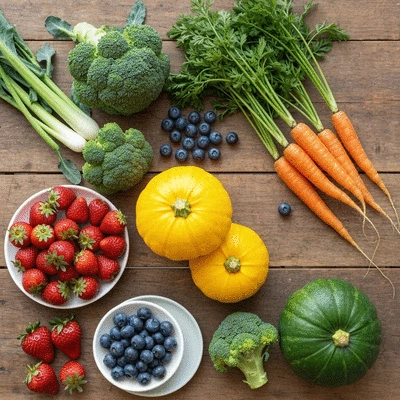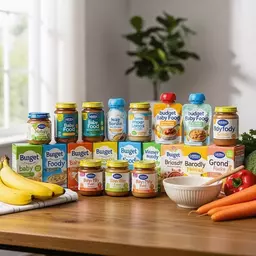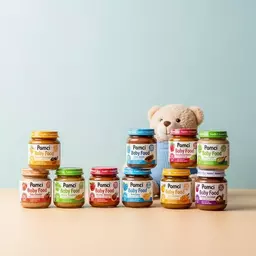Organic Baby Food Ingredients Guide

How would you feel knowing that the food you choose for your baby is not only nutritious but also supports sustainable farming practices? By prioritizing organic ingredients, you're making a significant investment in your child's health and the environment. Let's discover the essential takeaways for sourcing organic baby food!
What You Will Learn
- Organic ingredients reduce exposure to harmful pesticides and chemicals, promoting safer food for your baby.
- Choosing organic can enhance the flavor and nutritional quality of baby food, providing essential vitamins and minerals for growth.
- Understanding organic certification helps ensure that the products meet strict guidelines, ensuring quality and safety.
- Local farmers' markets and organic grocers are excellent sources for fresh, seasonal organic produce, which is ideal for homemade baby food.
- Comparing prices and options can lead to better deals on organic products, making healthy choices more accessible for families.
Homemade vs. Ready-Made Organic Baby Food: A Comparison
This comparison highlights the pros and cons of homemade versus ready-made organic baby food, helping parents make informed decisions based on their lifestyle and baby's needs. For more detailed insights into preparing your own, check out our homemade baby food recipes guide.
Homemade Baby Food
Pros:
- Complete control over ingredients (organic, no hidden additives).
- Cost-effective (large batches save money).
- Personalized nutrition (tailor flavors/textures).
Cons:
- Time-consuming (preparation, cooking, storage).
- Consistency challenges (achieving perfect texture).
Ready-Made Organic Baby Food
Pros:
- Convenience (ready to eat, perfect for busy parents).
- Standardized quality (high organic standards).
- Variety (wide range of flavors and combinations).
Cons:
- Potential higher cost than homemade.
- Less control over customization of ingredients/flavors.
Your Guide to Sourcing Organic Ingredients for Homemade Baby Food in Australia
As a dedicated nutrition enthusiast and a parent myself, I know how important it is to choose the right ingredients for our little ones. Sourcing organic ingredients for homemade baby food can feel daunting, but I'm here to guide you through it! By using organic produce, you’re not just making a statement about quality; you’re investing in your baby's health and well-being.
So, why should we focus on organic? Let’s explore the importance of organic ingredients and how they can make a significant difference for your baby’s nutrition!
Understanding the Importance of Organic Ingredients for Your Baby
When we talk about organic baby food, we’re discussing a choice that prioritizes health and safety. Organic ingredients are grown without harmful pesticides and synthetic fertilizers, ensuring a cleaner and safer food source for your little one. Here are the main reasons to consider organic:
- Fewer chemicals: Organic farming reduces exposure to synthetic pesticides.
- Better taste: Many parents find that organic fruits and vegetables have a richer flavor.
- Environmental benefits: Choosing organic supports sustainable agricultural practices.
With these benefits in mind, it’s easier to see why many parents, including myself, choose to go organic for our babies. Together, we can create nourishing meals that support healthy growth!

The Benefits of Organic Baby Food: Why Choose Organic?
One of the primary benefits of using organic baby food is the assurance of higher nutritional quality. Organic foods tend to retain more nutrients compared to their conventional counterparts. This means your baby is receiving more vitamins and minerals essential for healthy development. Additionally, many organic options are free from artificial preservatives, making them a safer choice for our little ones. For more information on what nutrients to look for, explore our nutrient-rich baby foods guide.
Choosing organic baby food isn’t just about what’s in the jar; it’s about the entire food experience. When we opt for organic ingredients, we’re setting the stage for healthy eating habits right from the start!
Key Nutritional Elements in Organic Baby Food
Organic baby food often includes key nutritional elements that are crucial for your baby's growth. Look for products rich in:
- Vitamins: Such as A, C, and E, which support immune health.
- Minerals: Including iron and calcium, essential for bone development.
- Healthy fats: Important for brain development, often found in avocados and certain oils.
These nutrients work together to promote overall health. By incorporating organic ingredients, we lay a strong foundation for our children’s future eating habits!
Health Benefits of Organic Food: What Research Shows
Research suggests that organic foods can offer numerous health benefits. Studies have shown that children who consume organic produce have lower levels of pesticide residues in their bodies. This is especially important for babies, as their developing systems are more susceptible to toxins.
Moreover, organic food often has higher antioxidant levels, which can help in combatting free radicals. When we nourish our babies with organic ingredients, we’re providing them with the best possible start in life.
Organic Certification Standards: What Parents Need to Know
As parents, it's essential to understand what organic certification means. This guarantees that the food you buy meets specific standards set by regulatory bodies. In Australia, organic certification ensures that products are genuinely organic and adhere to strict growing practices.
Let’s explore how to navigate organic certification, so we can confidently choose the best options for our babies!
Understanding Organic Farming Practices in Australia
Organic farming in Australia emphasizes sustainability and the health of both the environment and consumers. Farmers use methods that enhance soil fertility and biodiversity, avoiding synthetic chemicals and genetically modified organisms (GMOs). This means organic produce is not just better for your baby, but also for the planet!
Buying organic not only supports your child’s health but also encourages practices that help our environment thrive. Isn’t that an incredible win-win?
How to Identify Certified Organic Labels
When shopping, look for labels that indicate organic certification. In Australia, you might see logos like the Australian Certified Organic (ACO) or the National Association for Sustainable Agriculture Australia (NASAA). These labels confirm that the products meet organic standards and provide peace of mind that you're making a healthy choice.
Remember, not all labels are created equal! Being aware of these certifications helps ensure that you're getting genuine organic ingredients for your little one.
The Role of Organic Certification in Ensuring Quality
Organic certification plays a vital role in ensuring quality ingredients. It involves rigorous checks and audits to guarantee that farmers adhere to organic practices. This means you can trust that the food you're feeding your baby is free from harmful substances.
As a parent, this knowledge allows us to shop confidently. We can focus on nourishing our babies without the worry of harmful chemicals!
Where to Find Organic Ingredients for Homemade Baby Food
Now that we understand the significance of organic ingredients, let’s talk about where to find them! Sourcing fresh, organic produce is crucial for making delicious homemade baby food.
Here are some great places to look for organic ingredients:
Local Sources: Farmers Markets and Organic Grocers Across Australia
Visiting farmers' markets is one of my favorite ways to find fresh organic ingredients. Not only can you meet local farmers, but you also get to enjoy seasonal produce. Organic grocers often carry a wide variety of organic fruits and vegetables, making them a convenient option for busy parents.
- Check local listings to find farmers' markets near you.
- Look for organic grocers in your area; they often have knowledgeable staff who can help.
Online Retailers for Organic Baby Food Ingredients
If you're short on time, online retailers provide a quick and easy way to shop for organic ingredients. Many websites specialize in organic foods and can deliver right to your door. This is especially helpful for busy parents who can't always make it to the store.
Make sure to read reviews and check for certifications to ensure quality when shopping online!

Health Food Shops and Organic Food Stores: A Comprehensive Guide
Health food shops often stock a variety of organic options, from fresh produce to pantry staples. These stores are dedicated to providing healthier choices for consumers, making them a great go-to for ingredients for your homemade baby food.
- Visit your local health food store to discover a range of organic options.
- Ask staff for recommendations on the best organic products for baby food.
Comparison of Prices and Availability of Organic Products
When it comes to sourcing organic ingredients, it’s wise to compare prices and availability. Some stores may offer better deals than others, especially if they have promotions or loyalty programs. As parents, every dollar counts!
By doing a bit of research and shopping around, you can ensure you’re getting the best value without compromising quality.
Creating Homemade Baby Food: Recipes and Preparation Tips
With all the knowledge about sourcing organic ingredients, let’s dive into the fun part—making homemade baby food! Homemade baby food is not just nutritious; it’s also a wonderful way to introduce new flavors and textures to your little one.
Stay tuned as we explore some delicious recipes and helpful tips to make the process enjoyable for you and your baby!
Pro Tip
Did you know? When sourcing organic ingredients for your baby food, consider visiting local farmers' markets! Not only will you find fresh, seasonal produce, but you'll also have the opportunity to connect with local growers who can share insights about their farming practices. This adds an extra layer of assurance that you're providing the best for your little one!
Making Informed Choices for Your Baby's Nutrition
When it comes to choosing the right baby food for your little one, you may find yourself at a crossroads between homemade and ready-made organic options. Both have their merits, and as a devoted parent, you want the best for your child's nutrition. So, let’s dive into the essential factors to consider!
Weighing the Options: Homemade vs. Ready-Made Organic Baby Food
Deciding between making your own baby food or buying it pre-packaged can feel daunting. To help you make an informed choice, here are some pros and cons of each option:
- Homemade Baby Food: Gives you complete control over ingredients, allowing you to choose organic items without hidden additives.
- Cost-effective: Preparing large batches can save money in the long run.
- Personalized Nutrition: You can tailor flavors and textures to suit your baby's preferences.
- Time-consuming: Homemade baby food requires preparation, cooking, and storage time.
- Consistency Challenges: Achieving the perfect texture can be tricky, especially for beginners.
On the other hand, ready-made organic baby food provides its own conveniences. You can expect:
- Convenience: Ready to eat and perfect for busy parents!
- Standardized Quality: Most brands adhere to high-quality organic standards.
- Variety: A wide range of flavors and combinations to choose from.
- Potential Cost: Organic baby food can be pricier than homemade alternatives.
- Less Control: Limited ability to customize ingredients and flavors.
With both options presenting unique benefits and drawbacks, it’s essential to weigh them based on your family’s lifestyle and your baby's needs. What feels right for you? For a detailed comparison, explore homemade or store-bought baby food options.
What Parents Should Expect from Organic Baby Food Brands
When you opt for ready-made organic baby food, it helps to know what to expect. Many brands focus on the following:
- Quality Ingredients: Most organic baby foods are made with high-quality, non-GMO ingredients.
- Flavor Variety: Discover exciting flavors that can entice your baby's palate.
- Health Certifications: Look for labels that indicate compliance with organic standards.
- Nutritional Balance: Most brands strive to provide balanced nutrition tailored to your baby’s stage.
Don’t hesitate to check the ingredient list! A good brand should have simple, recognizable items without unnecessary additives.
Consulting Child Nutrition Experts for Guidance
If you’re still unsure about your choices, consulting with a child nutrition expert can be incredibly helpful. They can provide personalized advice based on your baby’s growth, dietary needs, and family preferences. The goal is to create a positive feeding experience that fosters healthy eating habits right from the start!
Conclusion: Prioritizing Quality and Sustainability in Baby Food Choices
In the end, whether you choose homemade or ready-made organic baby food, prioritizing quality and sustainability is key. You want to ensure your little one receives the best nutrition possible while also considering the environment. It’s a win-win!
Your Next Steps: Where to Buy and How to Prepare
For the best results, start exploring local organic markets or reputable online retailers. You can even consider a combination of both homemade and store-bought options. This way, you can provide a variety of tastes and nutrients while managing your time effectively. If you’re interested in recipes or tips for preparing meals, don’t miss our upcoming posts!
Encouraging a Healthy Start for Your Little One
Remember, establishing healthy eating habits early on can set the foundation for a lifetime of good nutrition. Celebrate your baby’s milestones—like trying new flavors—by staying engaged in the process. Ask questions, share experiences, and let your little one explore the vibrant world of food!
Exploring Baby Food Meal Plans for Balanced Nutrition
Lastly, consider implementing baby food meal plans that focus on balanced nutrition. This can help you stay organized and ensure that your baby receives a variety of nutrients each week. Are you ready to embark on this delicious journey? I’m excited to hear about what choices you make for your little one!
Frequently Asked Questions (FAQs)
- Why should I choose organic baby food for my child? Choosing organic baby food reduces your baby's exposure to harmful pesticides and synthetic chemicals, promoting a cleaner and safer food source. Organic foods also tend to offer higher nutritional quality with more essential vitamins and minerals.
- What is the difference between homemade and ready-made organic baby food? Homemade organic baby food offers complete control over ingredients, can be more cost-effective, and allows for personalized nutrition. However, it is time-consuming. Ready-made organic baby food offers convenience, standardized quality, and a wide variety of flavors but can be pricier and offers less customization.
- How can I ensure the organic baby food I buy is genuinely organic? Look for certified organic labels from regulatory bodies. In Australia, common labels include the Australian Certified Organic (ACO) or the National Association for Sustainable Agriculture Australia (NASAA). These certifications indicate adherence to strict organic farming practices.
- Where can I find organic ingredients or ready-made organic baby food in Australia? You can find organic ingredients at local farmers' markets, organic grocers, health food shops, and online retailers. Ready-made organic baby food is available at most supermarkets, health food stores, and specialized online shops.
- What are the key nutritional benefits found in organic baby food? Organic baby food is often rich in essential vitamins (like A, C, E), minerals (iron, calcium), and healthy fats, all crucial for your baby’s growth, immune system, bone development, and brain development.
Recap of Key Points
Here is a quick recap of the important points discussed in the article:
- Choosing organic ingredients reduces exposure to harmful pesticides and supports your baby's health.
- Organic baby food often has higher nutritional quality and retains essential vitamins and minerals.
- Look for certified organic labels like ACO and NASAA to ensure quality and authenticity.
- Local farmers' markets and organic grocers are great sources for fresh organic produce.
- Both homemade and ready-made organic baby food have their advantages; choose based on your lifestyle and your baby's needs.
- Consulting with child nutrition experts can provide personalized guidance for your baby's diet.
Popular Posts
 What if I told you that making your own baby food could not only save you money but also give you to
What if I told you that making your own baby food could not only save you money but also give you to
 What if the choice of your baby's food could shape their entire approach to nutrition for life? As y
What if the choice of your baby's food could shape their entire approach to nutrition for life? As y
 As you navigate the often overwhelming world of baby food shopping, it's essential to arm yourself w
As you navigate the often overwhelming world of baby food shopping, it's essential to arm yourself w
 As you embark on the journey of selecting the best baby food for your little one, you might wonder h
As you embark on the journey of selecting the best baby food for your little one, you might wonder h
